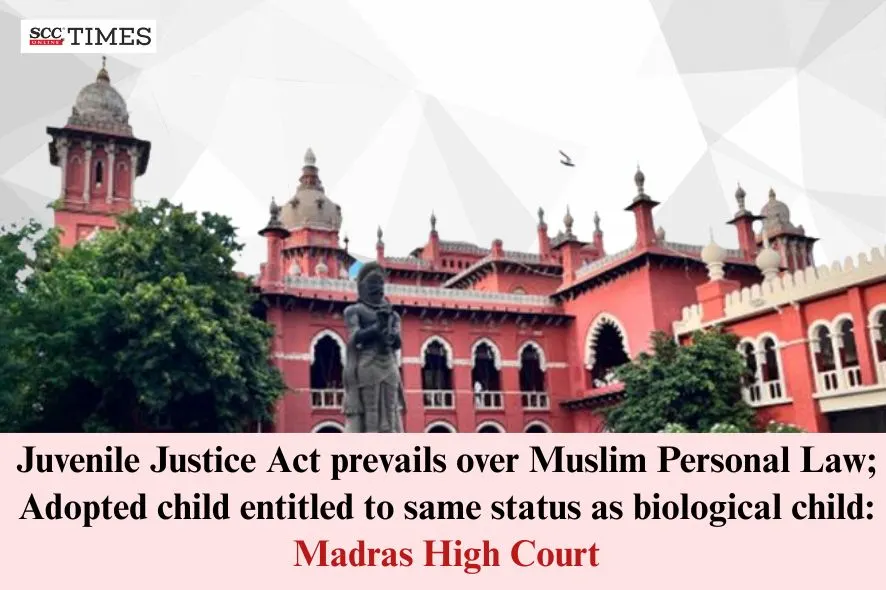Madras High Court: In the present petition, the petitioner sought direction for the registering authority to register an adoption deed for a child from within the family, which was allegedly refused on the ground that, being Muslims, the parties were required to follow the procedure under the Juvenile Justice Act, 2015 (‘JJ Act’) and the Adoption Regulations, 2022 (‘2022 Regulations’), rather than relying on a simple deed.
A Single Judge Bench of G. R. Swaminathan, J., while declining to issue the Mandamus, held that under the 2022 Regulations, the District Magistrate not the Court was the competent authority to issue the adoption order, and only upon such issuance can the adoption process be considered complete. The Court further held that a combined reading of Section 1(4) and Section 63 of the JJ Act, considering Article 15(3) of the Constitution, led to the conclusion that the JJ Act prevailed over Muslim Personal Law.
Background:
The petitioner and his wife were married but did not have any children. The petitioner’s brother passed away, leaving behind his wife and three children. One of these children was about eight years old. The petitioner’s widowed sister-in-law expressed her willingness to give this child in adoption to the petitioner and his wife, who were ready and willing to adopt the child.
Accordingly, an adoption deed was executed on 13-09-2025 and was submitted for registration. However, the registering authority refused to register the document. As a result, the petitioner filed the petition seeking appropriate relief.
Analysis and Decision:
The Court emphasised that although Islam did not recognise adoption, the Juvenile Justice (Care and Protection of Children) Act, 2000 (‘2000 Act’) and its 2015 version enabled adoption by willing parents regardless of religious background. Referring to Shabnam Hasmi v. UOI, (2014) 4 SCC 1, the Supreme Court held that the JJ Act was an enabling legislation offering the option to adopt under statutory provisions, irrespective of personal law.
The Court noted that the effect of the decision in Shabnam Hasmi (supra) was that a Christian or a Muslim was free to adopt a child in terms of the statutory scheme even though Islam and Christianity did not recognise adoption. In contrast, Hindus were governed by the Hindu Adoptions and Maintenance Act, 1956 (‘HAMA’) and Section 56(3) of the JJ Act clarified that its provisions did not apply to adoptions under the HAMA.
While disagreeing with a prior view that the JJ Act overrode personal law, the Court did not refer the matter to a Larger Bench, as the earlier decision was based on the repealed 2000 Act. Since the JJ Act governed the matter, and Section 56(3) of the JJ Act explicitly excluded Hindu adoptions from its scope, the Court held that the JJ Act could not override Hindu Personal Law.
The Court examined Sections 56 and 57 of the JJ Act which governed adoption of a relative’s child. It highlighted that under the 2022 Regulations, the District Magistrate and not the Court was the authority to issue the adoption order, and only upon issuance of this order was the adoption process complete. Section 63 of the JJ Act affirmed that the adopted child became the child of the adoptive parents as if born to them.
The Court further held that a combined reading of Section 1(4) and Section 63 of the JJ Act, 2015 considering Article 15(3) of the Constitution led to the conclusion that the JJ Act prevailed over Muslim Personal Law. Moreover, an adopted child was to have the same status as a biological child in all matters and could not be given second-class status.
Coming to the facts, the Court observed that the parties were Muslims and were required to follow the procedure laid down in the JJ Act and the 2022 Regulations. They could not simply execute and register an adoption deed, as the law did not recognise such a process. Since the adoption required consent of the biological parents, the parties were required to approach the District Child Protection Unit (‘CPU’) and the District Magistrate as per the 2022 Regulations. The requirement of obtaining consent from the Child Welfare Committee did not arise if the biological parents had already given consent.
The Court emphasised that a child below 18 years could not obviously give consent, so this expression was to be understood as ascertaining the child’s wishes. It further highlighted that the authorities (District Magistrate and CPU) were not bound to reject an adoption application solely because a child aged five years or above did not give consent. Thus, a holistic approach was to be adopted, with the child’s interest ranking paramount. Though the right to adopt was not yet recognised as a fundamental right under Article 21 of the Constitution, it was certainly a human right, as international conventions recognised the right to found a family, which included the right to adopt under statutory provisions.
The Court thus declined to issue the Mandamus sought. However, it permitted the parties to proceed by following the procedure laid down under the 2022 Regulations. The Court held that the CPU was to complete the verification process within three weeks from the date the application was uploaded on the portal, and it was the duty of the officials concerned to ensure that the uploading process was hassle-free.
Consequently, the Court directed that once the application was placed before the District Magistrate, it should be disposed of within three weeks. The Court further held that upon issuance of the adoption order by the District Magistrate, no separate registration was required. Accordingly, the petition was disposed of.
[K. Heerajohn v. District Registrar, 2025 SCC OnLine Mad 9155, decided on 17-10-2025]
Advocates who appeared in this case :
For the Petitioner: M. Pandian
For the Respondents: G. V. Vairam Santhosh, Additional Government Pleader



